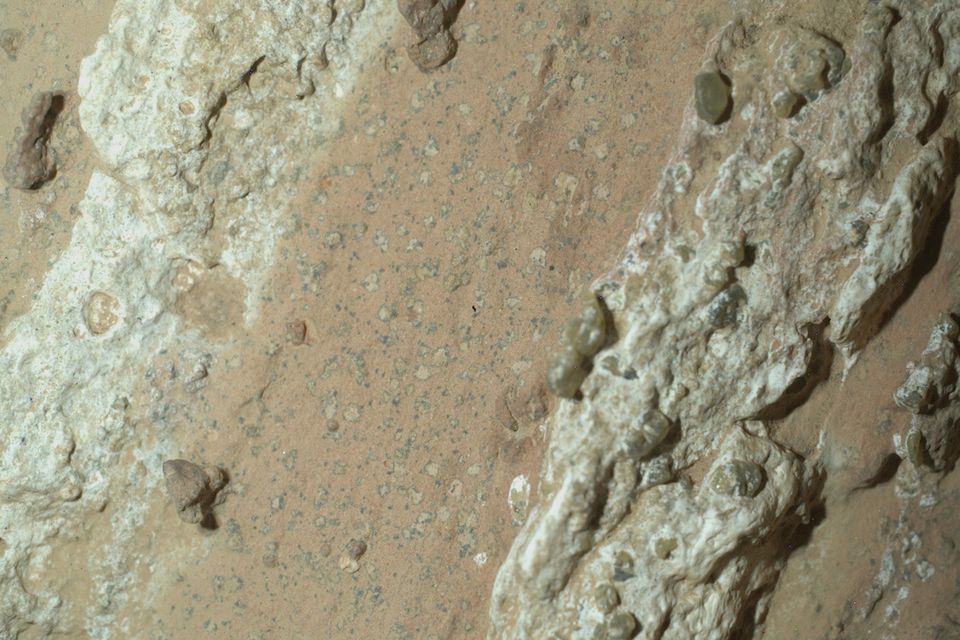Science
NASA’s Perseverance Rover Discovers Potential Signs of Life on Mars

NASA announced on October 25, 2023, that the Perseverance rover has detected potential biosignatures on Mars, raising intriguing questions about the planet’s ancient history. The rover identified tiny circular marks, dubbed “leopard spots,” on the surface of a mudstone estimated to be 3.5 billion years old. These markings resemble traces left by microbial life on Earth, suggesting that Mars may have once harbored life.
Dr. Seán Jordan from Dublin City University (DCU) is part of a team actively working to assess these findings. The team aims to analyze the implications of these biosignatures and their relevance to our understanding of life beyond Earth. Dr. Jordan emphasized the significance of this discovery, stating that it represents a pivotal moment in our exploration of Mars.
The markings were found in a region of the Martian surface that has long fascinated scientists. Mars, with its harsh environment, has often been considered inhospitable. However, findings like these challenge that perception, suggesting that ancient Mars may have supported life forms similar to those found in extreme environments on Earth today.
NASA’s announcement follows a series of successful missions aimed at exploring the planet’s geology and assessing its past habitability. The Perseverance rover, which landed on Mars in February 2021, has been equipped with advanced scientific instruments designed to analyze rock and soil samples. Its primary mission is to search for signs of ancient microbial life and collect samples for potential return to Earth.
As Dr. Jordan and his team continue their research, they will be looking closely at the data collected from these observations. The existence of biosignatures could reshape our understanding of where and how life can exist, not just on Mars but across the universe.
The implications of NASA’s findings extend beyond scientific curiosity. They could inform future missions and the ongoing quest for extraterrestrial life. This discovery also highlights the importance of international collaboration in space exploration, as scientists from various institutions, including DCU, contribute to a broader understanding of our solar system.
In conclusion, the discovery of potential biosignatures on Mars is a significant step forward in the search for life beyond Earth. As research progresses, the findings could provide valuable insights into the planet’s history and the conditions that may have allowed life to thrive in the distant past. The coming weeks and months will be crucial as Dr. Jordan and his team delve deeper into this exciting area of research, potentially rewriting what we know about our neighboring planet.
-

 Entertainment2 months ago
Entertainment2 months agoAimee Osbourne Joins Family for Emotional Tribute to Ozzy
-

 Top Stories2 days ago
Top Stories2 days agoTributes Surge for 9-Year-Old Leon Briody After Cancer Battle
-

 Politics2 months ago
Politics2 months agoDanny Healy-Rae Considers Complaint After Altercation with Garda
-

 Top Stories1 day ago
Top Stories1 day agoNewcastle West Woman Patricia Foley Found Safe After Urgent Search
-

 Top Stories4 weeks ago
Top Stories4 weeks agoIreland Enjoys Summer Heat as Hurricane Erin Approaches Atlantic
-

 World2 months ago
World2 months agoHawaii Commemorates 80 Years Since Hiroshima Bombing with Ceremony
-

 Top Stories2 months ago
Top Stories2 months agoFianna Fáil TDs Urgently Consider Maire Geoghegan-Quinn for Presidency
-

 World2 months ago
World2 months agoGaza Aid Distribution Tragedy: 20 Killed Amid Ongoing Violence
-

 World2 months ago
World2 months agoCouple Convicted of Murdering Two-Year-Old Grandson in Wales
-

 Top Stories2 months ago
Top Stories2 months agoClashes Erupt Between Far-Right Groups and Migrants in Spain
-

 World2 months ago
World2 months agoAristocrat Constance Marten and Partner Convicted of Infant Murder
-

 Top Stories2 months ago
Top Stories2 months agoHistoric Dalkey Pub The Queens Reopens Under New Management









